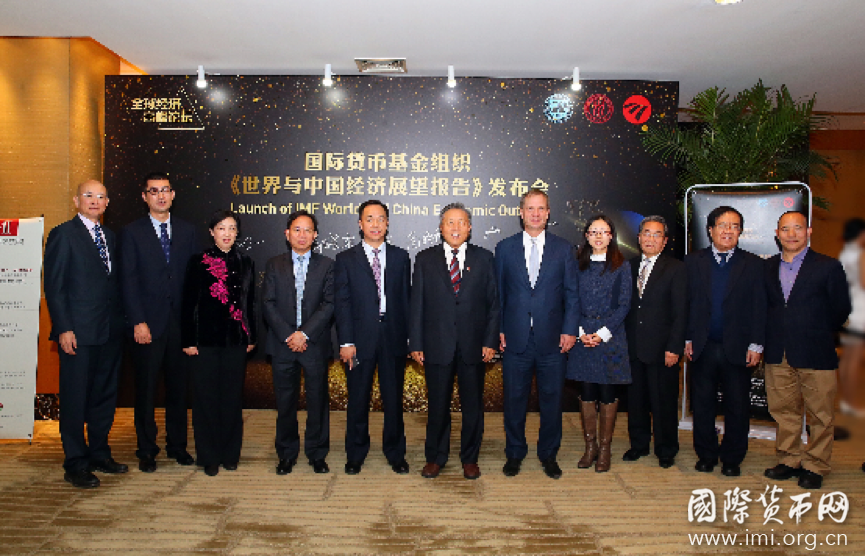Launch of IMF World and China Economic Outlook 2017
2017-10-31 IMI Prof. Zhuang Yumin and Mr. Zhou Xiaoquan gave opening remarks respectively. Prof. Zhuang said that the Launch of IMF World and China Economic Outlook aims to gather experts and scholars from Europe, America and Asia to discuss issues including global economic growth, China's economic outlook and the reform of the international monetary system. The World Economic Outlook released in October 2017 shows that despite the increasingly robust global economic growth, the economic recovery is still sluggish. More efforts at the multilateral level are required to tackle the challenges of globalization. The prospects for China's economic growth are good, showing strong momentum, but problems like the continued growth of private and public debt also exist. She encouraged the experts present to come up with more brilliant ideas to solve China's problems. Prof. Zhuang welcomed all guests, thanked all the experts for their attention and long-term support to IMI and wished the conference a complete success.
Prof. Zhuang Yumin and Mr. Zhou Xiaoquan gave opening remarks respectively. Prof. Zhuang said that the Launch of IMF World and China Economic Outlook aims to gather experts and scholars from Europe, America and Asia to discuss issues including global economic growth, China's economic outlook and the reform of the international monetary system. The World Economic Outlook released in October 2017 shows that despite the increasingly robust global economic growth, the economic recovery is still sluggish. More efforts at the multilateral level are required to tackle the challenges of globalization. The prospects for China's economic growth are good, showing strong momentum, but problems like the continued growth of private and public debt also exist. She encouraged the experts present to come up with more brilliant ideas to solve China's problems. Prof. Zhuang welcomed all guests, thanked all the experts for their attention and long-term support to IMI and wished the conference a complete success.
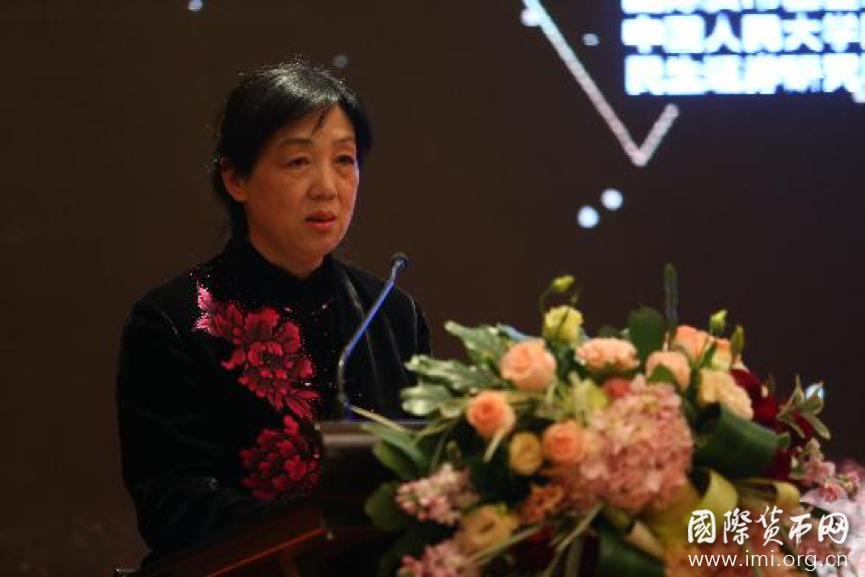 Mr. Zhou Xiaoquan said that this conference is a profound seminar in the new era under the guidance of the 19th CPC National Congress with the aim to make China a strong socialist modernized country. In the new era when the major social contradictions have changed, the capital market will face even higher demands. Minsheng Securities has always been dedicated to improving the efficiency of the financial industry in serving the real economy and its capability of supporting the economic restructuring for effective prevention and mitigation of financial risks. In the future, the company will continue to uphold the above objectives and work together with others in the industry for sustainable development of the industry. He sincerely looked forward to strengthening academic exchanges with the IMF and RUC and discussing new characteristics and trends of the global economic development.
Mr. Zhou Xiaoquan said that this conference is a profound seminar in the new era under the guidance of the 19th CPC National Congress with the aim to make China a strong socialist modernized country. In the new era when the major social contradictions have changed, the capital market will face even higher demands. Minsheng Securities has always been dedicated to improving the efficiency of the financial industry in serving the real economy and its capability of supporting the economic restructuring for effective prevention and mitigation of financial risks. In the future, the company will continue to uphold the above objectives and work together with others in the industry for sustainable development of the industry. He sincerely looked forward to strengthening academic exchanges with the IMF and RUC and discussing new characteristics and trends of the global economic development.
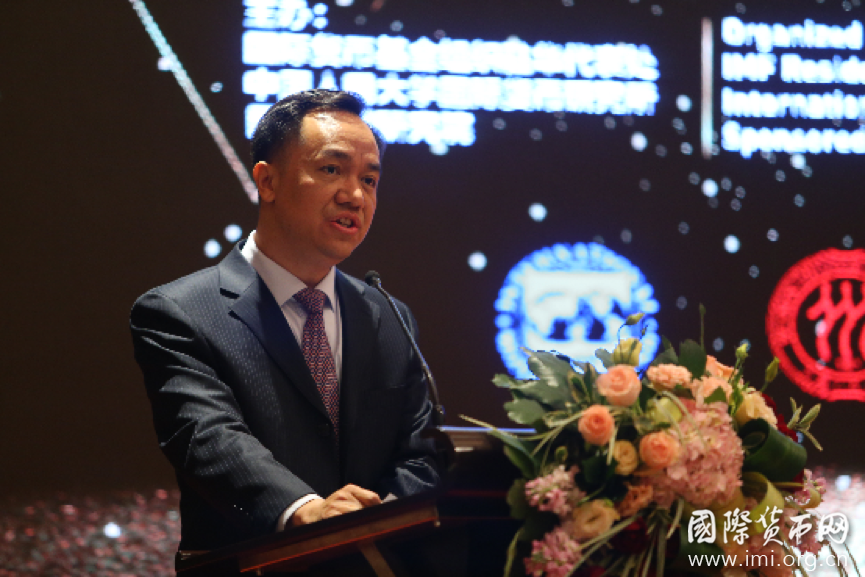 Mr. Alfred Schipke delivered a keynote speech themed “World Economic Outlook: Seeking Sustainable Growth: Short-Term Recovery, Long-Term Challenges”. He said both the hard indicator PMI and soft indicator CCI illustrate the increasingly robust growth of the global economy. The two indicators are projected to rise to 3.6% in 2017 and 3.7% in 2018 while China’s economic growth rate is expected to be 6.8% and 6.5% respectively. Broad-based upward revisions in the euro area, Japan, emerging Asia, emerging Europe, and Russia more than offset downward revisions for the United States and the United Kingdom. But the recovery is not complete: while the baseline outlook is strengthening, growth remains weak in many countries, and inflation is below target in most advanced economies. Commodity exporters, especially of fuel, are particularly hard hit as their adjustment to a sharp step-down in foreign earnings continues. And while short-term risks are broadly balanced, medium-term risks are still tilted to the downside. For policymakers, the welcome cyclical pickup in global activity provides an ideal window of opportunity to tackle key challenges—namely to boost potential output while ensuring its benefits are broadly shared, and to build resilience against downside risks.
Mr. Alfred Schipke delivered a keynote speech themed “World Economic Outlook: Seeking Sustainable Growth: Short-Term Recovery, Long-Term Challenges”. He said both the hard indicator PMI and soft indicator CCI illustrate the increasingly robust growth of the global economy. The two indicators are projected to rise to 3.6% in 2017 and 3.7% in 2018 while China’s economic growth rate is expected to be 6.8% and 6.5% respectively. Broad-based upward revisions in the euro area, Japan, emerging Asia, emerging Europe, and Russia more than offset downward revisions for the United States and the United Kingdom. But the recovery is not complete: while the baseline outlook is strengthening, growth remains weak in many countries, and inflation is below target in most advanced economies. Commodity exporters, especially of fuel, are particularly hard hit as their adjustment to a sharp step-down in foreign earnings continues. And while short-term risks are broadly balanced, medium-term risks are still tilted to the downside. For policymakers, the welcome cyclical pickup in global activity provides an ideal window of opportunity to tackle key challenges—namely to boost potential output while ensuring its benefits are broadly shared, and to build resilience against downside risks.
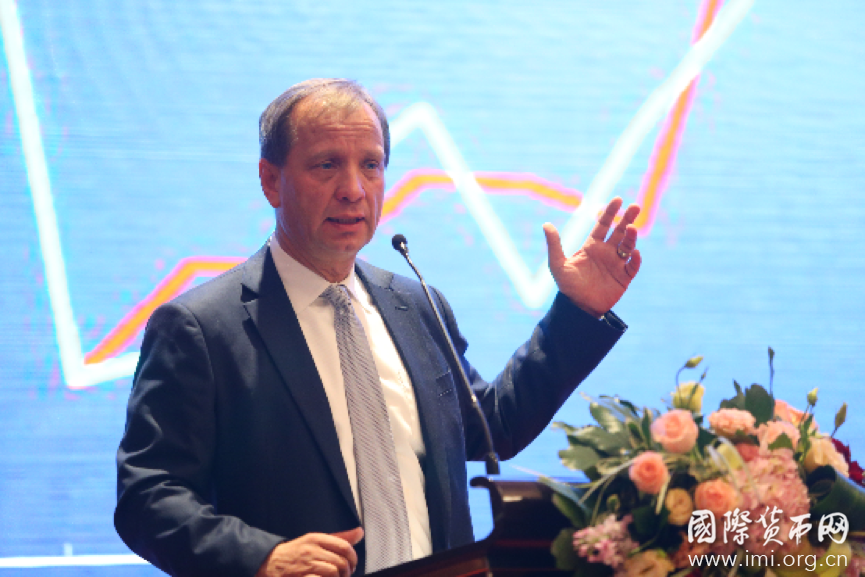 Prof. Wu Xiaoqiu made a keynote speech titled “To Open China's Financial Sector and Build an International Financial Center”. He systematically elaborated on how China will build a modern economic system and its matching modern financial system. He believes that a modern economic system should have five essential features: First, modern manufacturing, modern equipment industry and emerging industries reflecting the progress of modern industries must play a leading role in the modern economy; Second, the economy must be green and environment-friendly; Third, quality rather than quantity should be the pursuit in the future; Fourth, the modern economic system China wants to build must be led by the market instead of government; Fifth, though modern manufacturing and modern equipment industry are the foundation of the economic system, the central role belongs to modern financial industry. Mr. Wu pointed out that as the core and cornerstone of modern economy, the modern financial system should be much market-oriented, fully integrated with science and technology, and highly open. If such a modern economy and financial system can be constructed, there will be no barriers for China to realize sustainable growth.
Prof. Wu Xiaoqiu made a keynote speech titled “To Open China's Financial Sector and Build an International Financial Center”. He systematically elaborated on how China will build a modern economic system and its matching modern financial system. He believes that a modern economic system should have five essential features: First, modern manufacturing, modern equipment industry and emerging industries reflecting the progress of modern industries must play a leading role in the modern economy; Second, the economy must be green and environment-friendly; Third, quality rather than quantity should be the pursuit in the future; Fourth, the modern economic system China wants to build must be led by the market instead of government; Fifth, though modern manufacturing and modern equipment industry are the foundation of the economic system, the central role belongs to modern financial industry. Mr. Wu pointed out that as the core and cornerstone of modern economy, the modern financial system should be much market-oriented, fully integrated with science and technology, and highly open. If such a modern economy and financial system can be constructed, there will be no barriers for China to realize sustainable growth.
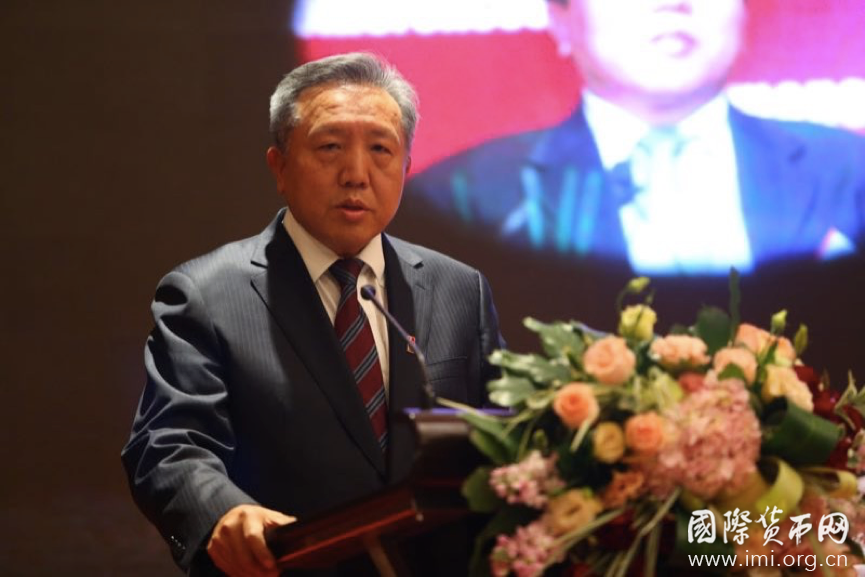 Ms. Zhang Longmei made a keynote speech titled “China: Make the most of the upswing”. She said that the global economy is recovering and that the prospects for China's economic growth have been adjusted upward. This is a good time to push forward reforms for long-term economic growth in China. But, she also made clear the challenges China's economy still faces—its growth depends highly on credit expansion but the growing debt scale has increased the downside risk in the medium term. After that, she proposed two solutions to reduce the credit intensity and the vulnerability of China's economy, which are re-balancing the economy and improving the efficiency of investment itself. She also suggested that to better re-balance the economy, China should adopt more structural adjustments apart from fine-tuning its fiscal policies.
Ms. Zhang Longmei made a keynote speech titled “China: Make the most of the upswing”. She said that the global economy is recovering and that the prospects for China's economic growth have been adjusted upward. This is a good time to push forward reforms for long-term economic growth in China. But, she also made clear the challenges China's economy still faces—its growth depends highly on credit expansion but the growing debt scale has increased the downside risk in the medium term. After that, she proposed two solutions to reduce the credit intensity and the vulnerability of China's economy, which are re-balancing the economy and improving the efficiency of investment itself. She also suggested that to better re-balance the economy, China should adopt more structural adjustments apart from fine-tuning its fiscal policies.
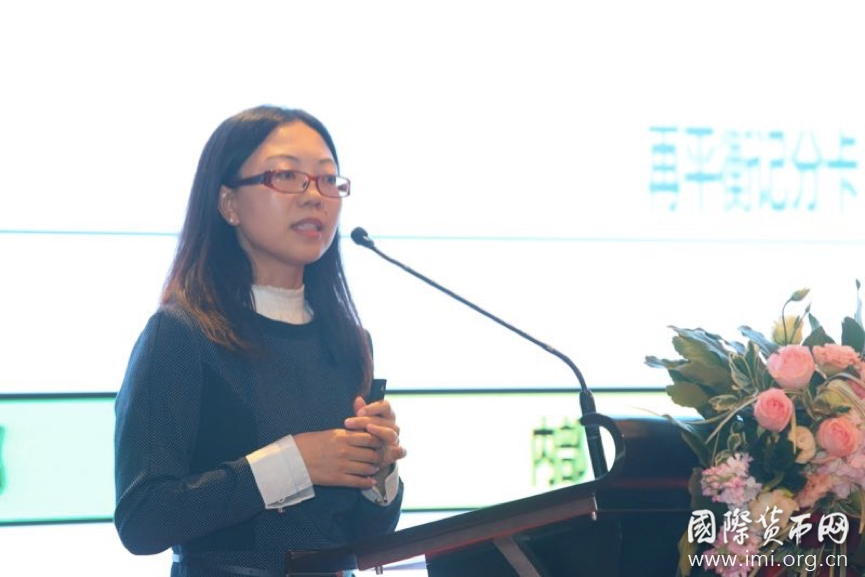 The chief economist Qiu Xiaohua delivered a keynote speech titled “China's Economy after the 19th CPC National Congress”. He pointed out that in the future, China's economy will lead a new development under the guidance of a dream, i.e., the Chinese dream of the great rejuvenation of the Chinese nation, which is made up of two centenary goals and three phases. All policies will center on this. China will upgrade both domestic and international economic platforms. The domestic one focuses on content such as Made in China 2025, Internet+, intelligence and innovation while the international upgrade includes RMB internationalization, the Belt and Road initiative, the establishment of free trade zones and the new International investment and financing system. The new development of China’s economy will be promoted by three leaps: transnational operation, cross-border integration and cross-ownership. The Chinese economy will be supported by four major new dividends, namely, demographic quality, comprehensive reform, deep opening and mass innovation. China's economy in the next stage will further incorporate the five major new concepts of development advocated by the Chinese government since the 18th CPC National Congress. In other words, innovation, coordination, green, opening and sharing will be truly embedded into China's development. Finally, Mr. Qiu said that China's development has entered a new phase when the dawn of a new cycle begins to take shape. This new cycle has six features: the relatively stable growth rate, better development quality and efficiency, further optimized structure, enhanced well-being of the people, better society order, and policies progressing steadily.
The chief economist Qiu Xiaohua delivered a keynote speech titled “China's Economy after the 19th CPC National Congress”. He pointed out that in the future, China's economy will lead a new development under the guidance of a dream, i.e., the Chinese dream of the great rejuvenation of the Chinese nation, which is made up of two centenary goals and three phases. All policies will center on this. China will upgrade both domestic and international economic platforms. The domestic one focuses on content such as Made in China 2025, Internet+, intelligence and innovation while the international upgrade includes RMB internationalization, the Belt and Road initiative, the establishment of free trade zones and the new International investment and financing system. The new development of China’s economy will be promoted by three leaps: transnational operation, cross-border integration and cross-ownership. The Chinese economy will be supported by four major new dividends, namely, demographic quality, comprehensive reform, deep opening and mass innovation. China's economy in the next stage will further incorporate the five major new concepts of development advocated by the Chinese government since the 18th CPC National Congress. In other words, innovation, coordination, green, opening and sharing will be truly embedded into China's development. Finally, Mr. Qiu said that China's development has entered a new phase when the dawn of a new cycle begins to take shape. This new cycle has six features: the relatively stable growth rate, better development quality and efficiency, further optimized structure, enhanced well-being of the people, better society order, and policies progressing steadily.
 The round-table discussion was presided over by Zhang Yu, IMI Researcher and Director of Fixed Income and Co-Head of the Asset Allocation and Strategic Investment Research Center at Minsheng Securities Academy. During the discussion, Mr. Wei Benhua suggested that great importance must be attached to the risk of global macroeconomic policy uncertainty. The IMF should strengthen its ability in monitoring the global economy. Dr. Er-Cheng Hwa said that China's current financial risks are more stable than those in the US and that the complicated issue of global governance requires attention. Mr. Alfred Schipke thought that attention should be paid to how to resolve geopolitical risks and pointed out that the IMF has been working hard to promote reforms to better support the strengthening of the international trade system. Ms. Zhang Longmei believed that a big risk for multilateral financial organizations is protectionism and she is very optimistic about the future of RMB internationalization.
The round-table discussion was presided over by Zhang Yu, IMI Researcher and Director of Fixed Income and Co-Head of the Asset Allocation and Strategic Investment Research Center at Minsheng Securities Academy. During the discussion, Mr. Wei Benhua suggested that great importance must be attached to the risk of global macroeconomic policy uncertainty. The IMF should strengthen its ability in monitoring the global economy. Dr. Er-Cheng Hwa said that China's current financial risks are more stable than those in the US and that the complicated issue of global governance requires attention. Mr. Alfred Schipke thought that attention should be paid to how to resolve geopolitical risks and pointed out that the IMF has been working hard to promote reforms to better support the strengthening of the international trade system. Ms. Zhang Longmei believed that a big risk for multilateral financial organizations is protectionism and she is very optimistic about the future of RMB internationalization.
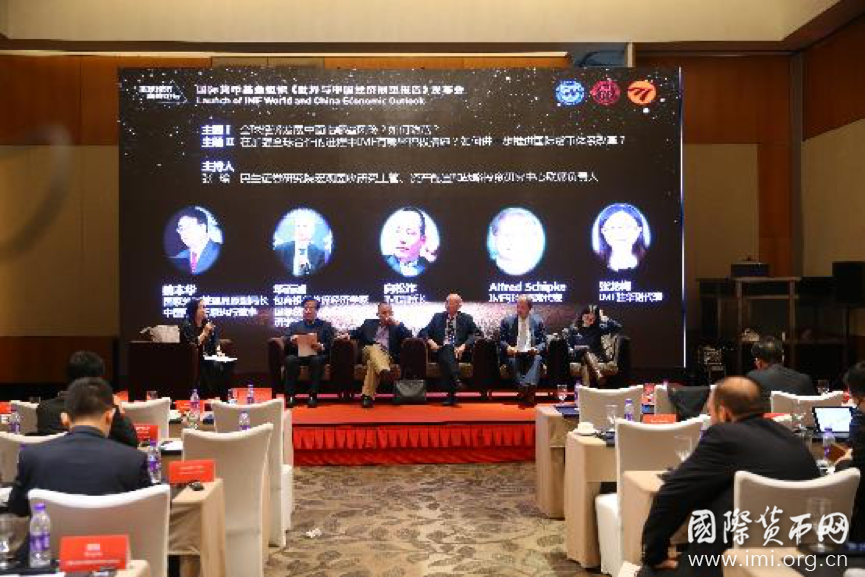 Besides, Mr. Keiji Shibata, Minister from the Japanese Embassy to China, Pyeongseob Yang, Representative of Korea Institute for International Economic Policy in Beijing, Zhong Hong, Deputy Director of International Finance Institute of Bank of China, Zhang Xiaotao, Dean of Institute of Finance and Economics Research of Central University of Finance and Economics, Wu Zhifeng, Director of Division I of International Strategies of the China Development Bank Research Center, and economic counsellors from the British, the US, Japanese, and South Korean embassies to China also attended the meeting.
Besides, Mr. Keiji Shibata, Minister from the Japanese Embassy to China, Pyeongseob Yang, Representative of Korea Institute for International Economic Policy in Beijing, Zhong Hong, Deputy Director of International Finance Institute of Bank of China, Zhang Xiaotao, Dean of Institute of Finance and Economics Research of Central University of Finance and Economics, Wu Zhifeng, Director of Division I of International Strategies of the China Development Bank Research Center, and economic counsellors from the British, the US, Japanese, and South Korean embassies to China also attended the meeting.
